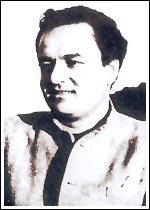
HOME | MOVIES | FEEDBACK |

Dinesh Raheja
August 27, 2002 marks the 26th death anniversary of the sonorous singer Mukesh
Cauterising intensity is the phrase that springs to mind when you hear a Mukesh number. The depth of emotion coursing through this singer's stridently masculine yet vulnerable voice is unmistakable --- in immortal songs like Jaane kahan gaye woh din or Koi jab tumhara hriday.
He could sing dance floor fluff (Dum dum diga diga or Hum toh tere aashiq hai sadiyon purane), and he could drip aural ambrosia in songs like Chandan sa badan. But Mukesh was truly magnificent in his philosophical songs (Chal akela, Jeena isika naam hai, Duniya bananewale) and his extraordinary repertoire of melancholic songs.
Mukesh had a shorter life span than the two other great playback singers (Mohammed Rafi passed away at 55; Kishore Kumar died at 58). But in his 53 years, Mukesh achieved a lofty stature not only as a singer but as a soft-souled human being, too.
Born in Delhi in 1923 as Mukesh Chand Mathur, he was part of a large family of 11 siblings. Young Mukesh was an unabashed fan of singer-actor K L Saigal. When 1940s star and Mukesh's distant relative Motilal visited Delhi, he was hugely impressed by Mukesh's impromptu singing and magnanimously arranged for his voice training in Mumbai.
But Mukesh had to struggle for a break in the movies. Cast opposite a still adolescent Nalini Jaywant, he first appeared as an actor-singer in Nirdosh (1941). Though both Jaywant and Mukesh began in the early 1940s, fortune deigned to smile on them only at the end of the decade.
A few more indifferent films later, two things happened almost simultaneously: Mukesh eloped with the love of his life, Saral, in 1946; maestro Anil Biswas offered him the chance to playback for the Motilal starrer Pehli Nazar (1945). Mukesh imbued the song Dil jalta hai toh jalne de, with such force and finesse that he had a resounding hit on his hands.
Thanks to the Saigal influence in Dil jalta hai, people often mistook him as the singer. And it was Anil Biswas who helped Mukesh assert his individuality with songs like Jeevan sapna toot gaya in Anokha Pyar (1948).
Simultaneously, Mukesh benefitted immensely from the care lavished on him by Naushad in 1948-1949 (they inexplicably parted ways thereafter). In Naushad's Mela and Anokhi Ada, Mukesh had several songs; he was the bedrock for the tenor of Naushad's Andaaz (1949) score, with four beautiful solos (take Tu kahe agar, and Jhoom jhooom ke) .
Mukesh was now a sensation. His classical base may have been looked at askance, but people responded to the sincerity in his smooth voice.
Strangely, Mukesh was seen as Dilip Kumar's voice initially, especially after Mela, Andaaz and Shabnam, but that changed after the success of the Raj Kapoor-Mukesh combination in Awara (1951). After Awara hoon, Mukesh came to be known as Raj Kapoor's ghost voice (though Mukesh wasn't Kapoor's exclusive voice in the early fifties; he did only the ocassional Kapoor film outside the R K banner).
But just when Mukesh was hitting a high note, the acting bug bit him again. Completely sidelining his flourishing playback career, he decided to become an actor and did Mashuqa opposite Suraiya in 1953. The film flopped as did his next attempt, Anuraag (1956) with Usha Kiron.
A chastened Mukesh, who had taken to singing only the occasional Mera joota hai Japani for Raj Kapoor, returned to playback singing full time, only to find the field crowded. Even Kapoor had resorted to Manna Dey for hits like Pyar hua iqrar hua (Shri 420) and Yeh raat bheegi bheegi (Chori Chori).
Mukesh passed through some trying times and for a while he didn't have money to pay his children's school fees.
Gradually, the Raj Kapoor-Shanker Jaikishan-Mukesh jugalbandi fell into place once again. Their Anadi in 1959 was a thumping success. It won Mukesh his first (of four) Filmfare trophies as Best Playback Singer for his heartwarming rendition of Sab kuch seekha hamne.
And Mukesh found new believers in Salil Chowdhary (who created gems for the singer from Madhumati to Anand), and Khayyam (from Phir Subah Hogi to Kabhi Kabhie).
This crooner seemed to have special insight into the complexities of human pain. Even a reluctant S D Burman had to come to Mukesh for the finely-modulated emotional catharsis of Chalri sajni and Bandini's O jaanewale. Naushad returned to Mukesh for the highly emotional Husn-e-jaana from Saathi. Mukesh's old friend Roshan always knew how to use his voice effectively, in songs like Oh re taal mile.
The sixties were a creatively fulfilling time for Mukesh with the new wave of music directors like Kalyanji Anandji and Laxmikant Pyarelal successfully trying his voice on a wider range of heroes. One more star came to be increasingly identified with Mukesh --- Manoj Kumar --- after K-A' s Himalay Ki God Mein, Upkar and Purab Aur Paschim. LP gave Mukesh a huge hit as the voice of Sunil Dutt in Milan, and even teamed him with Jeetendra for hits in Dharti Kahe Pukar Ke.
Backed by talent and goodwill, Mukesh remained busy, in-demand right till his death.
When he went on his final doomed concert to America in 1976, he was riding a wave of hits in 1975 and 1976, like Sanyasi, Dharmatma, Dharam Karam, Kabhi Kabhie and Dus Numbri.
His heart problems worsened and he finally succumbed in Detroit. Mukesh, however, had the satisfaction of seeing his son Nitin Mukesh being well received on stage.
You might also want to read:
|
||||||||||||
© 1996 - 2002 rediff.com India Limited. All Rights Reserved. |
|||||||||||||